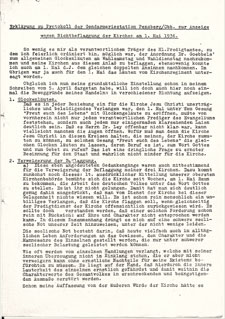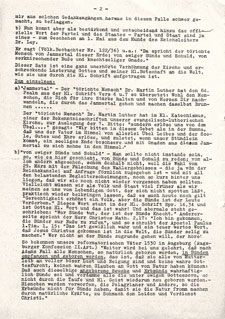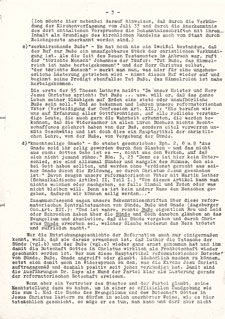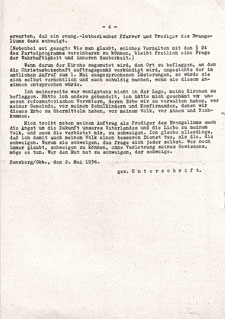Clashes with the State and the Church Government
Karl Steinbauer was made the senior vicar in Penzberg on April 1, 1933 and thus given a parish of his own. Clashes with the district NSDAP leader already occurred there in July of 1933 because Steinbauer had ensured that the Penzberg church council retained its old makeup during the church elections and did not fall into the hands of church councilmen who were party members.
A serious conflict was sparked in 1935 on the occasion of the Nazi “resurrection ceremony” for the “fallen” of the Beer Hall Putsch of November 9, 1923. The dead of the failed putsch attempt, revered as heroes by the Nazis, were exhumed and translated to the newly erected “temples of honor” on Munich’s Königsplatz in the night of November 8 to 9, 1935. All churches were instructed to display the flag to mark this ceremony. Charges were brought against Steinbauer for refusing to display the flag and he was sentenced to two weeks of jail time. The church government did not display any understanding for his actions. Regional Bishop Hans Meiser (1881-1956) remarked that he did not understand Steinbauer’s fuss; after all, the National Socialists had organized a perfectly dignified ceremony (K. Steinbauer, Zeugnis 1, 257).
The next conflict occurred when display of the flag and bell-ringing were ordered once again for the Reichstag elections on March 29, 1936. Steinbauer fundamentally held the view that the church is not a subordinate state enterprise (K. Steinbauer, Zeugnis 2, 3). He had therefore instructed his sextons to display the flag or ring the bells on occasions of state only with his consent. All the same, a sexton rang the bells on March 29. Aware of the electoral fraud and therefore having cast a “No” vote in the election, Steinbauer ordered the sexton not to ring the bells and was reported to the authorities. He explained during his interrogation by the police that he had been unable to let a “Yes” be said to this fraud by ringing the bells and pretending before God and his parish as if the election were an occasion to fall to one’s knees and to thank God (K. Steinbauer, Zeugnis 2, 4).
The church government summoned Steinbauer to Munich because of this criminal complaint. The regional bishop pointed out the consequences for the regional church if all of the pastors had not rung the bells. Steinbauer replied, You are obviously not taking into consideration that the bell-ringing also had consequences, namely that the men of state and party will not take another piece of bread away from the church. ... These people must think that the church is quite capable of redeeming obvious fraud by ringing its bells when the state so directs. Admonished that the church government alone bore responsibility and he had to obey the bishop’s instructions, Steinbauer, replied, We are not Roman Catholic but rather Evangelical Lutheran. The bishop of the Protestant parish in Penzberg am I and not you ... I can and may not allow this responsibility to be taken away from me by anyone (K. Steinbauer, Zeugnis 2, 5f). Steinbauer additionally made reference to his ordination and his installation by his congregation in Penzberg.
Steinbauer again refused to ring the bells and display the flag during the May Day celebration of 1936 because of Robert Ley’s (1890–1945) anti-church and anti-Christian appeal. Steinbauer was thus risking arrest despite his wife Eugenie’s pregnancy. A criminal complaint was filed against Steinbauer when, at the Gestapo’s behest, the local gendarme observed the absence of any flags on display.
On May 2, 1936, two days before the birth of his first daughter Elisabeth, Steinbauer prepared a statement for his interrogation at the Penzberg gendarmerie station in which he provided detailed reasons for his conduct. This statement not only left a strong impression with the local gendarmerie but also became known throughout the entire Confessing Church in Germany. Although the church government in Munich respected his loyalty to his convictions, it disapproved of and issued a warning for his refusal to obey his superiors by not displaying the flag.
Source / title
- © Landeskirchliches Archiv Nürnberg, PA Theol. 5387/4 Steinbauer Karl




